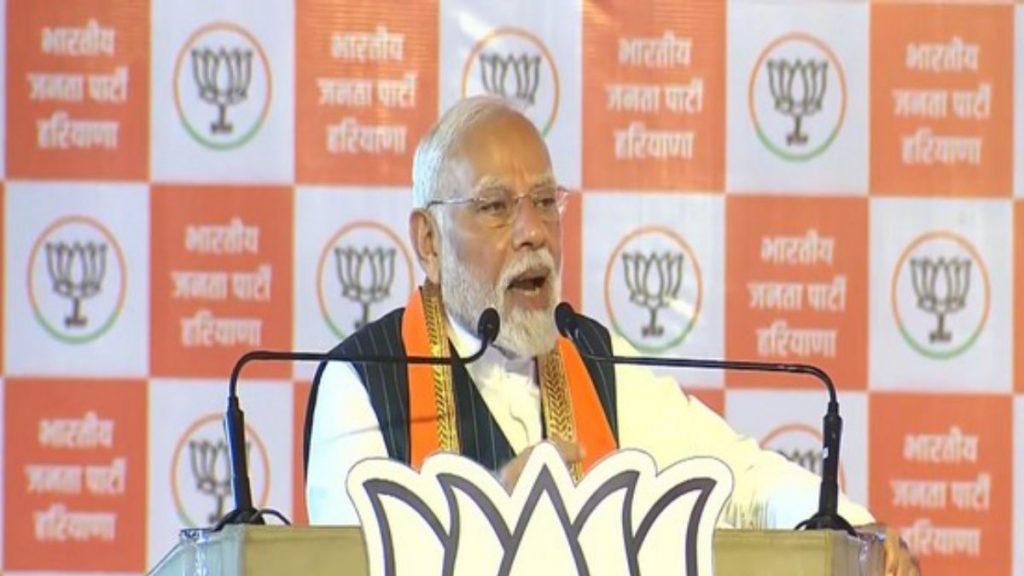New Delhi: After taking office for a third consecutive term, the Modi 3.0 government has implemented several key initiatives in its first 100 days aimed at improving the livelihoods of farmers and the middle class.
Narendra Modi was sworn in as the Prime Minister of India for the third time on June 9. He began his third term in office by releasing the 17th instalment of the Pradhan Mantri Kisan Samman Nidhi (PM-KISAN) scheme.
According to government sources, under the scheme, Rs 20,000 crore has been distributed among 9.3 crore farmers, and so far, Rs 3 lakh crore has been disbursed among a total of 12 crore 33 lakh farmers.
Along with this, the Minimum Support Price (MSP) for Kharif crops for the year 2024-25 has been increased, which has benefitted farmers by approximately Rs 2 lakh crore. The PM Modi-led government has also approved the Polavaram Irrigation Project in Andhra Pradesh with an allocation of Rs 12,100 crore.
The Centre has also approved seven major schemes with a total outlay of Rs 14,200 crore, including the Digital Agriculture Mission, to enhance efficiency and productivity in the agricultural sector.
As per the sources, the draft policy of the new National Cooperative Policy has also been prepared and is now in its final stages.
The sources also mentioned that under a MoU between the National Cooperative Organics Limited (NCOL) and the Uttarakhand Organic Commodity Board, the NCOL will purchase organic produce from Uttarakhand’s farmers at rates for farmers.
“An appropriate share of the profits will be directly deposited into the farmers’ accounts,” they said.
“The conversion of cooperative sugar mills’ ethanol production units into multi-feed facilities will enable ethanol production from maize as well,” the sources added.
The Centre has decided to remove the Minimum Export Price (MEP) on onions and basmati rice and reduce the export duty on onions from 40 per cent to 20 per cent which can likely benefit the farmers.
The government has initiated several agricultural schemes and development projects worth Rs 3,300 crore in Jammu and Kashmir.
During his first visit to Varanasi in June this year, PM Modi honoured 30,000 ‘Krishi Sakhis’ from self-help groups for their role in agriculture.
According to sources, the Centre has approved Rs 2,000 crore “Mission Mausam” to create a weather- and climate-resilient India. Along with this, it has launched a new fund named ‘Agrisure’, aimed at revolutionising the agricultural sector and supporting start-ups and rural enterprises. To ensure the upliftment of the middle class, the central government has given tax relief under which there is no tax on income up to Rs 7 lakh.
As per the sources, salaried individuals can save up to Rs 17,500 in taxes. “The standard deduction has been increased to Rs 75,000 and the exemption limit for family pension raised to Rs 25,000,” they said.
The government has also ensured that a comprehensive review of income tax rules is conducted within six months to make them concise, clear, and easy to understand. The Unified Pension Scheme (UPS) has been implemented under which government employees with 25 years of service will receive 50 per cent of their average basic salary as a pension.
“The third iteration of the One Rank, One Pension scheme will be implemented for security forces and their families,” the sources mentioned.
Mentioning the Pradhan Mantri Awas Yojana, the sources said that one crore houses under the urban scheme have been built, while two crore houses have been approved for construction in rural areas. “Under PM Surya Ghar Muft Bijli Yojana, solar energy systems have been installed in over 2.5 lakh homes between June and August 2024. An environmentally friendly public transport system will be developed through PM E-Bus service, and for that, approval has been given for the purchase of e-buses with the assistance of Rs 3,400 crore,” they added.

